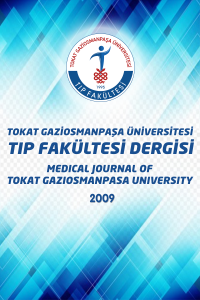Antrokoanal Polibin Maksiller Sinüs Boyut ve Hacmine Etkisi: Bir İnce Kesit Bilgisayarlı Tomografi Çalışması
Antrokoanal polip, maksiller sinüs, hacim
The Effect Of Antrochoanal Polyp on Maxillary Sinus Size and Volume: A Thin-Slice Computed Tomography Analysis Study
Antrochoanal polyp, Maxillary sinus, Volume,
___
- 1. Bozzo C, Garrel R, Meloni F, Stomeo F, Crampette L. Endoscopic treatment of antrochoanal polyps. Eur Arch Otorhinolaryngol 2007; 264:145–50.
- 2. Franche GL, Granzotto EH, de Borba AT, Hermes F, Saleh C de S, de Souza PA. Endoscopic polypectomy with middle meatal antrostomy for antrochoanal polyp treatment. Braz J Otorhinolaryngol 2007;73:689–92.
- 3. Robson AK, Barker CS, Whittet HB. Epistaxis as an unusual presentation of an antrochonal polyp. J Laryngol Otol. 1990;104:643–4.
- 4. Balikci HH, Ozkul MH, Uvacin O, Yasar H, Karakas M, Gurdal M. Antrochoanal polyposis: analysis of 34 cases. Eur Arch Otorhinolaryngol 2013; 270:1651–4
- 5. Azhar A, Ibrahim G, Salah F. Ct scan images analysis of maxillary sinus dimensions as a forensic tool for sexual and racial detection in a sample of kurdish population. ESJ. 2015;11:271-81
- 6. Ekizoglu O, Inci E, Hocaoglu E, Sayin İ, Kayhan F.T, Can I.O. The use of maxillary sinus dimensions in gender determination: a thin-slice multidetector computed tomography assisted morphometric study. Journal of Craniofacial Surgery, 2014;25:957–60
- 7. Konen E, Faibel M, Kleinbaum Y, et al. The value of the occipitomental (Waters’) view in diagnosis of sinusitis: a comparative study with computed tomography. Clin Radiol 2000;55:856–60
- 8. Cook PR, Davis WE, McDonald R, McKinsey JP. Antrochoanal polyposis: a review of 33 cases. Ear Nose Throat J. 1993;72:401-2.
- 9. Larsen K, Tos M. The estimated incidence of symptomatic nasal polyps. Acta Otolaryngol. 2002;122:179-182
- 10. Mostafa H.S, Fawzy T.O, Jabri W.R, Ayad E. Lymphatic obstruction: a novel etiologic factor in the formation of antrochoanal polyps. Annals of Otology, Rhinology and Laryngology, 2014;123:381–6
- 11. Paknahad M, Shahidi S,Zarei Z. Sexual Dimorphism of Maxillary Sinus Dimensions Using Cone-Beam Computed Tomography. Journal of Forensic Sciences. 2017;62:395-8
- 12. Urooge A, Patil BA. Sexual dimorphism of maxillary sinus: a morphometric analysis using cone beam computed tomography. Journal of Clinical and Diagnostic Research. 2017;11:67-70
- 13. Aydın S, Taskin U, Orhan I, Altas B, Oktay MF, Toksöz M, Albayrak R. The analysis of the maxillary sinus volumes and the nasal septal deviation in patients with antrochoanal polyps. Eur Arch Otorhinolaryngol. 2015;272:3347-52
- 14. Kula K, Hale LN, Ghoneima A, Tholpady S, Starbuck JM. Cone-beam computed tomography analysis of mucosal thickening in unilateral cleft lip and palate maxillary sinuses. Cleft Palate Craniofac J 2016;53:640–8
- 15. Erdur, O, Ucar, FI, Sekerci, AE, Celikoglu, M, Buyuk, SK. Maxillary sinus volumes of patients with unilateral cleft lip and palate. Int J Pediatr Otorhinolaryngol. 2015;79:1741–4
- 16. Jiang C, Yin N, Zheng Y, Song T. Characteristics of maxillary morphology in unilateral cleft lip and palate patients compared to normal subjects and skeletal class III patients. J Craniofac Surg. 2015;26:517–23
- 17. Abdel- Aziz M, El- Hoshy H, Azooz K, Naguib N, Hussein A. Maxillary sinus mucocele: predisposing factors, clinical presentations, and treatment. Oral and Maxillofacial Surgery 2017; 21:55-8
- 18. Busaba NY, Salman SD. Maxillary sinus mucoceles: clinical presentation and long-term results of endoscopic surgical treatment. Laryngoscope 1999; 109:1446-9
- 19. Patel PA, Warren SM, McCarthy JG. Maxillary mucocele with proptosis and visual impairment: a late complication of Le Fort III distraction. J Craniofac Surg 2013;24:2000-2
- ISSN: 1309-3320
- Başlangıç: 2009
- Yayıncı: Tokat Gaziosmanpaşa Üniversitesi
Penil Epidermoid Kist: Olgu Sunumu
Engin KÖLÜKÇÜ, Mehmet Necmettin MERCİMEK
Engin KÖLÜKÇÜ, Latif Mustafa ÖZBEK, Salih Rahman CEYLAN
Solunum sıkıntısında farklı iki neden, tek kaynak: Diyafram hernisi ve evantrasyonu
Selçuk GÜRZ, Ayşen Taslak ŞENGÜL, Yasemin Bilgin BÜYÜKKARABACAK, Burçin ÇELİK, Necmiye Gül TEMEL, Mehmet Gökhan PİRZİRENLİ, Ahmet BAŞOĞLU
Akut Biliyer Pankreatit Hastalarında ERCP Gereksinimi Tahmin Edilebilir mi?
DeğiĢen Ġklim KoĢullarına KarĢı Çiftlik Hayvanlarında Genetik Adaptasyon Mekanizmaları
